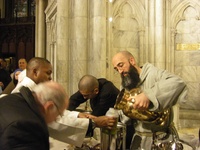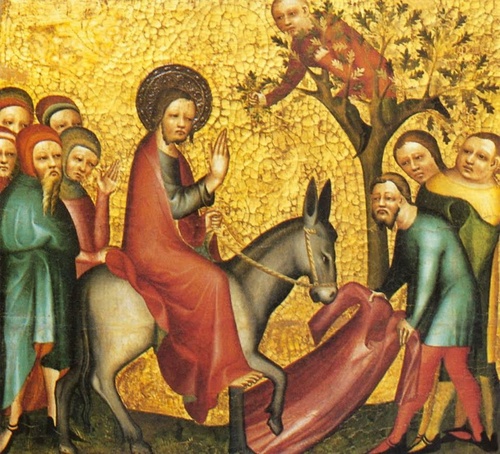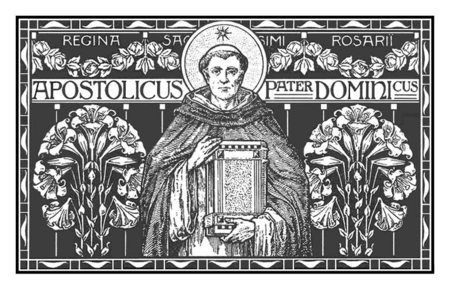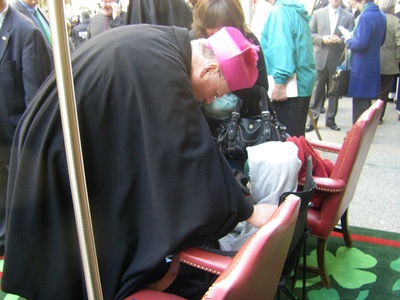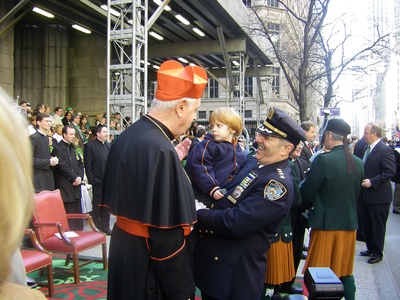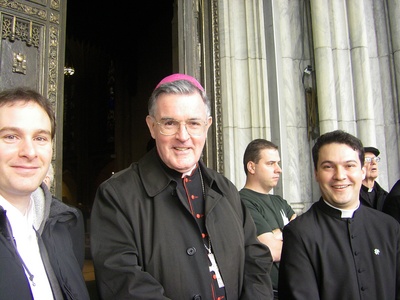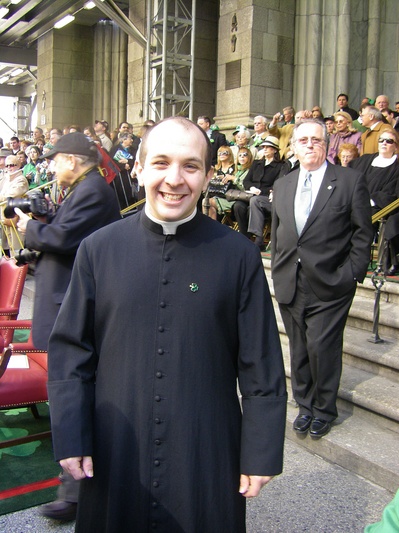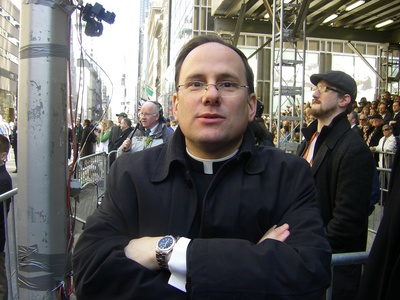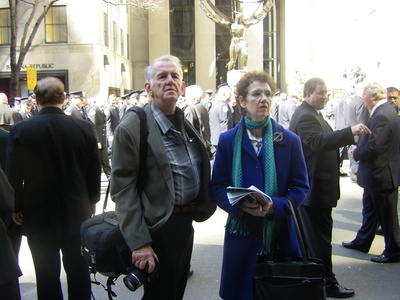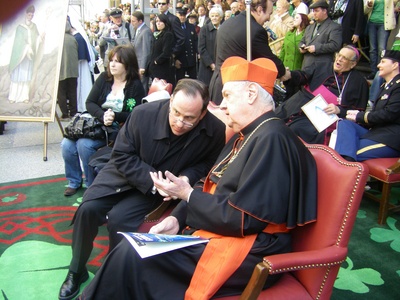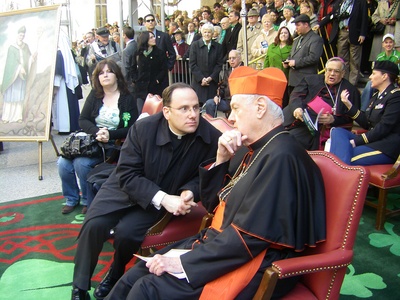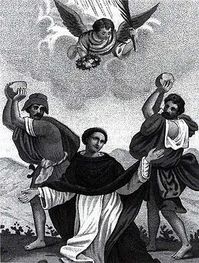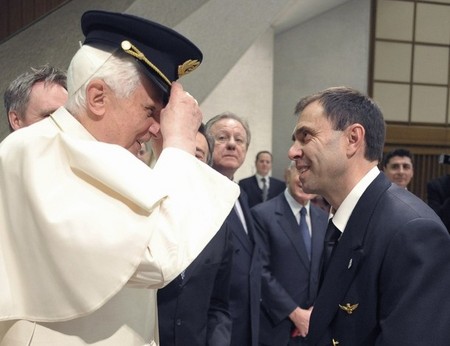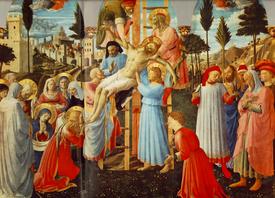 St Catherine of Siena Church and Priory has announced its liturgical program for the sacred Triduum Services (Holy Thursday, Good Friday, Holy Saturday and Easter Sunday).
St Catherine of Siena Church and Priory has announced its liturgical program for the sacred Triduum Services (Holy Thursday, Good Friday, Holy Saturday and Easter Sunday).Paul Zalonski: March 2010 Archives
 St Catherine of Siena Church and Priory has announced its liturgical program for the sacred Triduum Services (Holy Thursday, Good Friday, Holy Saturday and Easter Sunday).
St Catherine of Siena Church and Priory has announced its liturgical program for the sacred Triduum Services (Holy Thursday, Good Friday, Holy Saturday and Easter Sunday). The Church as often called today "spy Wednesday" because of the betrayal of Christ one hears made by Judas. The name Judas is forever linked with the concept of betrayal. In Dante's Inferno (Canto XXXIV) we see Judas in the lowest circle of Hell being eternally consumed by a three-faced winged devil. Imagine the affective hurt of being betrayed by a friend!
The Church as often called today "spy Wednesday" because of the betrayal of Christ one hears made by Judas. The name Judas is forever linked with the concept of betrayal. In Dante's Inferno (Canto XXXIV) we see Judas in the lowest circle of Hell being eternally consumed by a three-faced winged devil. Imagine the affective hurt of being betrayed by a friend!
The Church prays
O God, who willed Your Son to undergo on our behalf the gibbet of the Cross so that You might drive away from us the power of the enemy, grant to us Your servants, that we may obtain the grace of the resurrection.
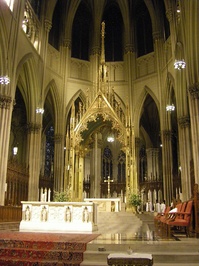 The Sacrifice of the Mass with the Rite of Blessing of Oils at St Patrick's Cathedral was celebrated by Archbishop Timothy M. Dolan and concelebrate by the four active NY auxiliary bishops. This year we were blessed to have with us Bishop-elect Jude Ayodeji Arogundade, 48, (of Ondo, Nigeria). Bishop-elect Jude has been the parish administrator of an Elmsford, NY parish until his recent appointment to Nigeria, for which he leaves for in the middle of April; his ordination to the episcopacy is May 6. Cardinal Edward M. Egan presided in choir robes (his 78th birthday is April 2). About 400 secular and religious order priests concelebrated the Mass and renewed their commitment to priestly service.
The Sacrifice of the Mass with the Rite of Blessing of Oils at St Patrick's Cathedral was celebrated by Archbishop Timothy M. Dolan and concelebrate by the four active NY auxiliary bishops. This year we were blessed to have with us Bishop-elect Jude Ayodeji Arogundade, 48, (of Ondo, Nigeria). Bishop-elect Jude has been the parish administrator of an Elmsford, NY parish until his recent appointment to Nigeria, for which he leaves for in the middle of April; his ordination to the episcopacy is May 6. Cardinal Edward M. Egan presided in choir robes (his 78th birthday is April 2). About 400 secular and religious order priests concelebrated the Mass and renewed their commitment to priestly service.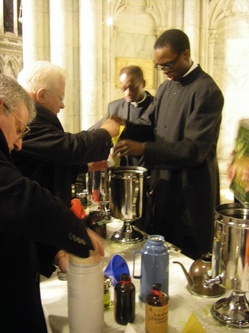
No Catholic should be surprised that there is filth in the Church for Our Lord Himself told us that this would be so in the parable of the weeds among the wheat (Matthew 13:24-30). AND it's no surprise that the Church is full of sinners, sinners who commit grave sin. And yes, some who claim to follow Christ commit evil and everything possible must be done to stem the evil and to make amends for that pain generated by that evil.
Furthermore, no Catholic should be surprised that the Faith should once again be attacked during Easter because this is an annual event. However, this year's annual Easter attack on the Faith has taken the form of one upon the person of the Pope, Benedict XVI, himself.
What truly saddens me, however, is that there are many within the Church herself, those who should know better, that are once again attempting to create a Christianity without Christ. But if we forget Christ, if we do away with the wholly different measure that He introduces into the world now, through the Church, then we no longer have the terms on which to judge the Church.

In October I posted a piece on the Franciscan Friars' wine making hobby. Franciscan Friar of the Renewal Brother Giuseppe Maria Siniscalchi had an idea a few years ago to make homemade wine when he wasn't hitting the theology books. The friars do more than study, serve the poor, run the Catholic Underground-- they cheer the heart with their wine which is a very human thing to do. This is the second year for Our Lady of Cana wines. Perhaps this may be a new franchise for the friars!!! I'm looking forward to a 3rd year of winemaking. AND I am willing to be the wine-quality control guy.
With grapes handpicked and materials donated by friends, and help from the other friars, Brother Giuseppi made a great barrel of wine. Of course, nature did her part and God His... For the last six months the wine has matured --and we've been eagerly waiting for the maturing process to work-- in a basement corner in an oak barrel. The wine now sufficiently mature, today was the time to bottle.
Deacon James Ferreira, Ken Riello (a 1st yr Dunwoodian) and yours truly set out to watch, assist and taste the fruit of the earth. James was most kind in bringing some great bread, cheese and soppressata.
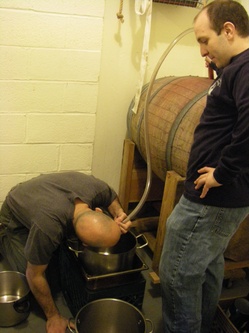
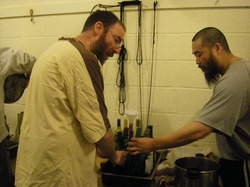
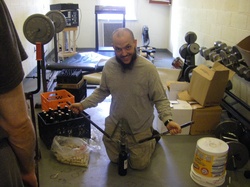
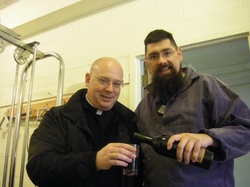
We had great fun bottling nearly 275 bottles of wine. James, I hear, has a case of wine for his first Mass in May! AND this event was SO Catholic!
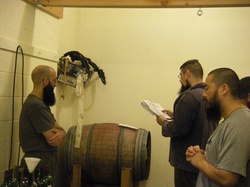
Always thinking liturgically, the soon-to-be-priested, Friar Deacon Charles blessed the new wine using this text, but here is another version of the blessing of wine:
The Blessing of Wine in Honor of Saint John the Evangelist
Lord, have mercy on us. Christ, have mercy on us. Lord, have mercy on us.
Pray Psalm 22 and then the Our Father
V. And lead us not into temptation.
R. But deliver us from evil.
V. Preserve thy servants.
R. That trust in thee, my God.
V. Send them aid, O Lord, from heaven.
R. And from Sion watch over them.
V. Let the enemy be powerless over them.
R. And the son of evil do nothing to harm them.
V. And should they drink anything deadly.
R. May it not hurt them.
V. O Lord, hear my prayer.
R. And let my cry come unto thee.
V. The Lord be with you.
R. And with your spirit.
Let us pray.
Holy Lord, Father Almighty, eternal God! Who didst will that thy Son, equal to thee in eternity and substance, should descend from heaven and in the fullness of time take temporal birth of the most holy Virgin Mary, so that He could seek the lost and wayward sheep and carry it on His shoulders to the sheepfold, and could cure the man fallen among robbers of his wounds by pouring in oil and wine-- do thou bless + and sanctify + this wine which thou hast vintaged for man's drink. Whoever partakes of it on this holy solemnity, grant him life in body and soul. By thy goodness let it be to him strength in the pilgrimage to prosper him on the way, that his journey may come to a happy termination. Through the same Christ our Lord.
R. Amen.
Let us pray.
O Lord Jesus Christ, Who didst call thyself the true vine and thy holy apostles the branches, and didst desire to plant a chosen vineyard of all who love thee, bless + this wine and impart to it the power of thy benediction.+And as thy beloved disciple John, Apostle and Evangelist intercedes for them that partake thereof, grant them security from all deadly and poisonous afflictions and constant good health of soul and body. Who lives and reigns forever.
R. Amen.
Let us pray.
O God, thou gives to man bread to eat and wine to drink -- bread to nourish the body and wine to cheer the heart. And as thou didst confer upon blessed John, thy beloved disciple such favor that not only did he himself escape the poisoned potion, but could restore life to others so overcome; do thou grant to all that drink this wine spiritual joy and eternal life. Through our Lord Jesus Christ, thy Son, who with Thee, lives and reigns, in the unity of the Holy Spirit, one God, forever and ever.
R. Amen.
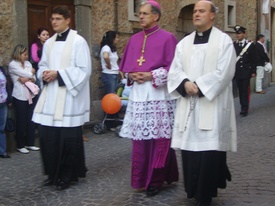 Last November I posted a story about a priest, Father Luigi Squarcia, 66, a priest of the Diocese of Viterbo, who was living with Lou Gehrig's Disease relating that Father Luigi was determined not to be defined by the ravages of a disease, nor to give into the nihilism of sickness and forthcoming death. What he did was remarkable: Father Luigi lived as a true Christian. He gathered up his sufferings for the life of the Mystical Body of the Church and gave them to the Lord in the person of Pope Benedict.
Last November I posted a story about a priest, Father Luigi Squarcia, 66, a priest of the Diocese of Viterbo, who was living with Lou Gehrig's Disease relating that Father Luigi was determined not to be defined by the ravages of a disease, nor to give into the nihilism of sickness and forthcoming death. What he did was remarkable: Father Luigi lived as a true Christian. He gathered up his sufferings for the life of the Mystical Body of the Church and gave them to the Lord in the person of Pope Benedict.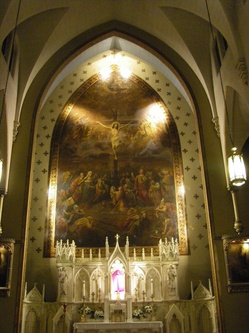 Cardinal Edward Michael Egan, emeritus archbishop of New York, preached at Mass tonight observing the the 15th anniversary of Evangelium Vitae at The Church of the Holy Innocents (West 37th Street, NYC). Holy Innocents is a beautiful church consecrated in 1901 by Archbishop Michael Corrigan.
Cardinal Edward Michael Egan, emeritus archbishop of New York, preached at Mass tonight observing the the 15th anniversary of Evangelium Vitae at The Church of the Holy Innocents (West 37th Street, NYC). Holy Innocents is a beautiful church consecrated in 1901 by Archbishop Michael Corrigan.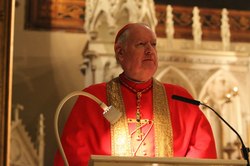
These pictures are extremely hard to look at, they are extremely graphic!!!
Let's pray for the miracle of peace between Muslims & Christians in northern Nigeria.
Unbelievable the depths to which human misery and animalistic passions can sink.
The pictures of the horrific murders of the Nigerians posted by the Anglican Diocese of Jos.
What are we doing about it?????
 As Christ came into the World, he said: Behold! I have come to do your will O God.
As Christ came into the World, he said: Behold! I have come to do your will O God.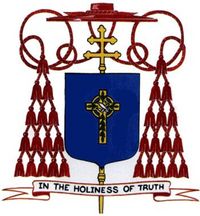 New York's Agnus Dei
Council of the Knights of Columbus announced that Edward Cardinal Egan
would attend and preach the homily at a Solemn Mass for the Feast of the
Annunciation but that he would not celebrate a Pontifical Mass as planned and
announced. This Mass will mark the 15th anniversary of Evangelium Vitae
(The Gospel of Life), the pro-life encyclical by Pope John Paul II issued on
March 25, 1995.
New York's Agnus Dei
Council of the Knights of Columbus announced that Edward Cardinal Egan
would attend and preach the homily at a Solemn Mass for the Feast of the
Annunciation but that he would not celebrate a Pontifical Mass as planned and
announced. This Mass will mark the 15th anniversary of Evangelium Vitae
(The Gospel of Life), the pro-life encyclical by Pope John Paul II issued on
March 25, 1995.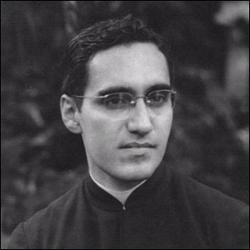 Today is the 30th anniversary of the assassination of
Oscar A. Romero, Archbishop of San Salvador, in El Salvador. He was murdered
while celebrating Mass at a cancer hospital where he lived. Finishing the
homily, a group of military death squad shot Romero.
Today is the 30th anniversary of the assassination of
Oscar A. Romero, Archbishop of San Salvador, in El Salvador. He was murdered
while celebrating Mass at a cancer hospital where he lived. Finishing the
homily, a group of military death squad shot Romero.  O God, who did endow Thy blessed confessor, Diego,
with the science of the saints and didst work wonders through him for the
salvation of his people, grant us through his intercession to think those
things that are right and just, so that we may arrive safely at the kingdom of
Thy glory.
O God, who did endow Thy blessed confessor, Diego,
with the science of the saints and didst work wonders through him for the
salvation of his people, grant us through his intercession to think those
things that are right and just, so that we may arrive safely at the kingdom of
Thy glory.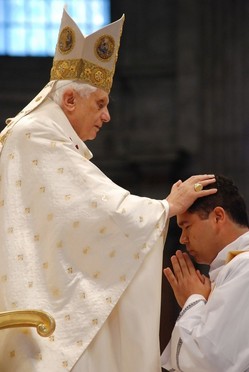
We know by experience that we have not sufficient strength in ourselves to bring to a successful completion our chief Lenten duty, which is to die fully to sin in order to live fully in the risen Christ. But Christ himself, before leaving his own, prayed to his Father to preserve them from evil and from the evil one, from the seductions of the world and the attacks of Satan. He taught them to ask, lead us not into temptation, but deliver us from evil.
Obviously he did not intend that his disciples be spared every kind of temptation and danger, for this would be impossible in this life; besides, God himself permits it to test our virtue, but he wanted to assure them sufficient strength to resist. The evil from which he desired to free them was sin, the only real disaster, because it separates us from God.
Divine Intimacy
Father
Gabriel of St. Mary Magdalen, OCD
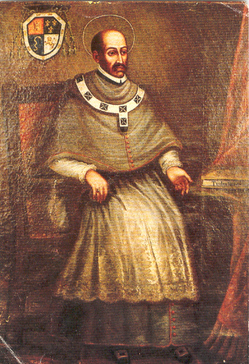 Lord. through the apostolic work of Saint Turibius and his unwavering love of truth, You helped Your Church to grow. May Your chosen people continue to grow in faith and holiness.
Lord. through the apostolic work of Saint Turibius and his unwavering love of truth, You helped Your Church to grow. May Your chosen people continue to grow in faith and holiness.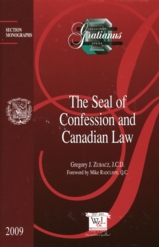 The Seal of Confession and Canadian Law by Gregory
Zubacz (Wilson & Lafleur, 2009)
The Seal of Confession and Canadian Law by Gregory
Zubacz (Wilson & Lafleur, 2009)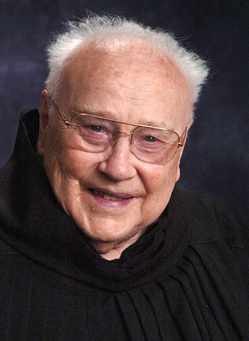 Saturday morning the great Benedictine monk and priest and Pro-life advocate died at the age of 90. Pray for Father Paul, his monastic community and the on-going work of the Culture of Life.
Saturday morning the great Benedictine monk and priest and Pro-life advocate died at the age of 90. Pray for Father Paul, his monastic community and the on-going work of the Culture of Life.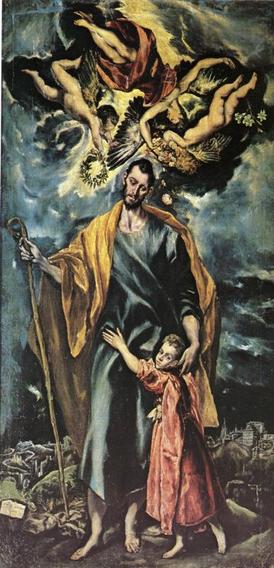 To you, O Blessed Joseph, we have recourse in our affliction, and having implored the help of your most holy Spouse, we seek with confidence thy patronage also. By that affection wherewith you were united to the Immaculate Virgin, Mother of God; by the fatherly love with which you did embrace the Child Jesus, we humbly beseech you to look down with gracious eye upon that inheritance which Jesus Christ purchased for us by His Blood, and to help us in our need by your powerful intercession.
To you, O Blessed Joseph, we have recourse in our affliction, and having implored the help of your most holy Spouse, we seek with confidence thy patronage also. By that affection wherewith you were united to the Immaculate Virgin, Mother of God; by the fatherly love with which you did embrace the Child Jesus, we humbly beseech you to look down with gracious eye upon that inheritance which Jesus Christ purchased for us by His Blood, and to help us in our need by your powerful intercession.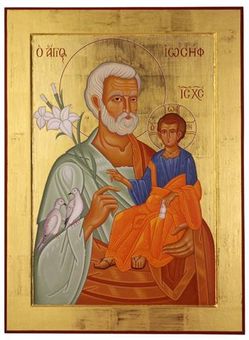
(The Blessing of the Altar frequently takes place the evening before the feast, March 18th. If there is a procession to the Altar, a hymn may be sung on the way.)
Celebrant

O, glorious Saint Joseph, we stand before this Altar with joyful and grateful hearts. We lovingly present to you the labor of our hands and the dedication of our hearts that have fashioned this Altar in your honor. We again place ourselves under your powerful protection. Help us follow your example of complete trust and faith in Divine Providence. Open our minds and hearts to love and serve the poor, the suffering and those rejected or ignored by society. As a family, teach us to love and honor each member of our families with the love and reverence you had for Jesus and Mary. As a nation, inspire in us the will and the way to live in peace with all nations of the world that in our day we can experience the fulfillment of Jesus' prayer--"Peace be to you." Grant this through Christ our Lord, who lives and reigns forever and ever. Amen.
V. O, Glorious Saint Joseph, through the love you bear to Jesus Christ and the glory of His name,
R. Hear our prayers and obtain our petitions.
Celebrant
Lord Jesus, bless this Altar, all this food, the candles and all those who visit it. We ask this in the name of the Father, + and of the Son and of the Holy Spirit. Amen.
(As the Altar is being blessed and incensed, the Litany of St. Joseph is said or a hymn is sung.)
All
Remember, O most pure spouse of the Blessed Virgin Mary, my sweet protector, Saint Joseph, that no one ever had recourse to your protection or implored your aid without obtaining relief. Confiding therefore in your goodness, I come before you and humbly supplicate you. O, despise not my petitions, foster father of our Redeemer, but graciously receive them. Amen.
(Now that the Altar
is blessed, guests are invited to visit the Altar and offer their own prayers
to Saint Joseph.)
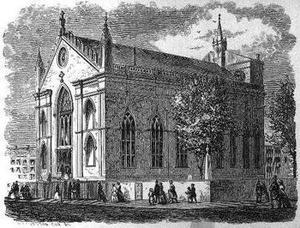 Great news for the Archdiocese of New York: Old St Patrick's Cathedral (since 1809) has been a minor basilica by Pope Benedict XVI.
Great news for the Archdiocese of New York: Old St Patrick's Cathedral (since 1809) has been a minor basilica by Pope Benedict XVI.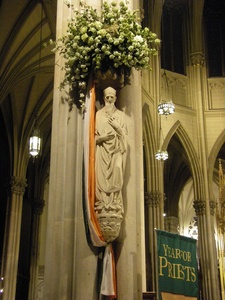
It was announced this morning by the Holy See that Pope Benedict XVI will beatify John Henry Newman on 19th September 2010, during his visit to the U.K., in the Archdiocese of Birmingham. The Cause of Newman's Canonisation has released the following statement:
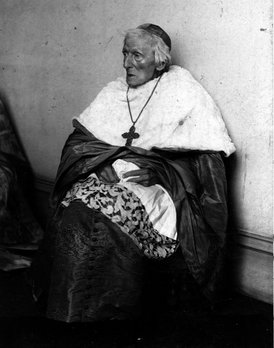
The Fathers and many friends of the English Oratories are delighted by the official announcement that our Holy Father Pope Benedict XVI will beatify our founder, the Venerable John Henry Newman, in the Archdiocese of Birmingham during his visit to Britain in September. Newman made his home in the Archdiocese for all his adult life, first in Oxford, where he lived as an Anglican and was received into the Catholic Church, and later in Birmingham itself where he founded and worked in the Birmingham Oratory for over forty years.
The Holy Father's life-long devotion to Newman has made a profound contribution to understanding the depth and significance of our founder's legacy. His decision to beatify Newman in person confers a unique blessing upon the English Oratories and all who have drawn inspiration from Newman's life and work.
We joyfully look forward to welcoming the Holy Father, as well as the many pilgrims and visitors who will come to the Beatification ceremony and visit Newman's shrine at the Birmingham Oratory.
We also look forward to the challenging work of preparing for the Beatification in conjunction with Church and civil authorities. We pray that the Beatification will fittingly reflect both Newman's significance for the Universal Church and the honour paid to our Archdiocese and our country by the Holy Father's presence among us.
Very Rev. Richard Duffield
Provost of the Birmingham Oratory and Actor of the Cause of John Henry Newman
Additionally, the Procurator of the Congregation of the Oratory, Very Reverend Father Edoardo Aldo Cerrato, CO, has written to the all the Oratories of the world on this great gesture of Pope Benedict XVI in personally beatifying the Venerable Servant of God John Henry Newman. The letter is here: Letter-of-the-Procurator-General-of-the-Oratory-Confederation-March-2010.pdf
The film, Pedro Arrupe: His Life and Legacy, was produced in 2008 by Georgetown University and features rare footage of Father Pedro Arrupe and interviews with his closest advisers.
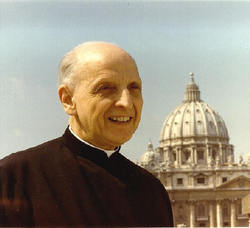
Father Arrupe was the 28th superior general of the Society of Jesus, from 1965-1983. Born in Bilbao, Spain in 1907, he studied medicine prior to entering the Jesuit order. Before his service as superior general, he served as Japan's first Jesuit provincial; but a defining moment in Arrupe's life was his work caring for the victims of the Hiroshima's atomic bomb. He died in Rome on February 5, 1991, after suffering the effects of a debilitating effects of a stroke on August 7, 1981 just as his airplane landed from an exhausting trip to the Far East. He was succeeded as Father General of the Society by Father Peter Hans Kolvenbach.
Father Arrupe's writings are some of the best works on Ignatian Spirituality there is. One memorable piece is his reflection on the Sacred Heart of Jesus. Before Father Kolvenbach was elected general, Father Arrupe's prayer was read to the elected delegates of the 33rd General Congregation, marking his true identity of being totally free to do God's will: "More than ever I find myself in the hands of God. This is what I have wanted all my life from my youth. But now there is a difference; the initiative is entirely with God. It is indeed a profound spiritual experience to know and feel myself so totally in God's hands."
This five-part documentary on Father Pedro Arrupe, SJ, is now available online on the Jesuit Channel, which is sponsored by the Association of Jesuit Colleges and Universities.
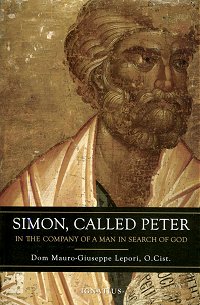
Ignatius Press recently published a new book on Saint Peter called, Simon, Called Peter: In the Company of a Man in Search of God by a Cistercian Abbot with roots in Communion and Liberation, Dom Mauro-Giuseppe Lepori, O.Cist.
Dom Mauro-Giuseppe Lepori, O.Cist. writes of his book: "At every stage of my life as a man, a Christian, a monk, an abbot, I have found Saint Peter to be a companion to walk ahead of me... Peter is the Gospel saint who is more 'us' than any other, closer to our own humanity, yet so close to Christ. Peter is the one we can always follow."
What others have said
You are carried into the events narrated here... and you see them with your own eyes and heart, more than if you had been there.
from the Foreword by Cardinal Angelo Scola, Patriarch of Venice
Dom Lepori's account of Peter reminds us of just how often this first of the Apostles appears in the Gospels. When we see Peter spelled out in his encounters with Christ, we realize that this 'Rock' is being formed, but also that he was someone who could be formed. It is not without interest that the Church is founded on Peter, a solid man, yet also a sinner. With Lepori's guidance, we realize that Peter's life is a portrait of how God deals with men. We cannot but be moved by this Peter, a man like unto us, sin included, but a brave man who acknowledges, who learns, who, in the end, is 'the Rock' that he was called to be from the first time Christ saw him.
James V. Schall, SJ, Author, The Order of Things
About the author
Dom Mauro-Giuseppe Lepori, O. Cist., is the abbot
of the Cistercian Abbey of Hauterive outside of Fribourg, Switzerland. He
received his licentiate in philosophy and theology from the Catholic University
of Fribourg and as a layman was an active member of Communion and Liberation.
In 1984, he entered the Abbey of Hauterive and ten years later was elected
abbot. Written originally in Italian, Simon Called Peter has been translated
into both French and German. Other works by Lepori include L'amato presente.
An interview with Dom Mauro-Giuseppe at the Rimini Meeting.
A brief essay by Dom Mauro called "The Re-Creation Brought about by Christ," published in Traces.
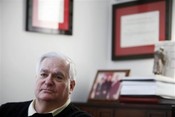 In some places you will get shouted down for supporting Pope Pius XII and his cause for sainthood. For some, Pius is a lightening rod and no amount of reasonable-ness will quiet their anxiety. I find this is especially true for the New York area. Undaunted by the challenge of the truth, Gary Krupp, founder of the Pave the Way Foundation, is working to get the truth of what Pope Pius XII did and didn't do into the public forum. He's trying to clear the air. For many the conversation is hard and painful but truth needs to be told and told with clarity, charity and firmness.
In some places you will get shouted down for supporting Pope Pius XII and his cause for sainthood. For some, Pius is a lightening rod and no amount of reasonable-ness will quiet their anxiety. I find this is especially true for the New York area. Undaunted by the challenge of the truth, Gary Krupp, founder of the Pave the Way Foundation, is working to get the truth of what Pope Pius XII did and didn't do into the public forum. He's trying to clear the air. For many the conversation is hard and painful but truth needs to be told and told with clarity, charity and firmness. March 19 is the solemnity of the Saint Joseph, husband of Blessed Virgin Mary. Time has gotten away from me and I am only now able to post a set of novena prayers to Saint Joseph. This solemn feast is a special feast and one that should not get away from us because of Saint Joseph's special care for the Church and personally for each one of us. While the days prior to the feast won't constitute nine days of prayer, perhaps this year we could begin the novena on the feast itself and next year start on March 10. These prayers were sent to me a kind Canadian reader of the Communio blog.

The daily novena prayer Saint Joseph
Remember, most pure spouse of Mary, ever Virgin, my loving protector, Saint Joseph, that no one ever had recourse to your protection or asked for your aid without obtaining relief. Confiding, therefore, in your goodness, I come before you and humbly implore you. Despise not my petitions, foster-father of the Redeemer, but graciously receive them. Amen
Day 1
O Saint Joseph, Pillar of Families! Foster Father of Jesus, protect our families from the sufferings of separation and divorce. Be a lighthouse for fathers and father-figures alike, so that they may lead virtuous lives and be good role models to our children. Amen.
Our Father, Hail Mary, Glory Be [these three prayers are to be said each day after the novena prayer]
Day 2
O Saint Joseph, Guardian of Virgins! Loving, chaste spouse of our Blessed Mother, protect the chastity of marriages so that our children may grow up in strong united families. We also ask you to protect the virginity of the youth so that they may be spared from unnecessary sufferings, and to help those living the consecrated life to be ever more faithful to their vocations. Amen.
Day 3
O Saint Joseph, Patron of the Unborn! Your faith was necessary to bring about the glory of the incarnation. Teach us all to have unbending confidence in the promises of Christ. May we submit ourselves wholeheartedly to His will and trust that His providence will see us through in difficult moments. Amen.
Day 4
O Saint Joseph, Terror of Demons! Help us defeat our untamed passions, imaginations and memories. Teach us to listen to the voice of our Father in the silence of our hearts, and give us the strength to have dominion over our senses. In times of weakness, may we closely depend on our intellect and will, and most importantly the graces generously given to us through prayer by our Lord Jesus Christ. Amen.
Day 5
O Saint Joseph, Hope of the sick and the dying. Heal us from our bodily ills, emotional troubles and worldly fears. Be with us in times of frailty, and comfort us with hope in eternal life. May our hearts be anchored in Jesus every day of our lives and may we never be separated from him. Amen.
Day 6
O Saint Joseph, Patron of the Church! Protect the intentions of our Holy Father Pope Benedict XVI, our Cardinals, Bishops, priests and all religious who work faithfully to shepherd the people. Keep them away from temptation, and deliver them from all unholy and corrupting influences. May our Church remain free from all contagion of error and be constantly reinvigorated by the Holy Spirit. Amen.
Day 7
O Saint Joseph, Patron of Workers! Comfort us during the desolation of unemployment, and bring compassion into our hearts during times of prosperity. Teach us the right paths and the right words, so that we may be able to meet our temporal needs. We also ask that you keep our hearts aflame with the Word of God, that we may always be conscious that our need for daily bread is not restricted to bread alone, but Jesus in the Eucharist. Amen.
Day 8
O Saint Joseph, Lover of Poverty! Solace of the wretched! Be our friend in time of suffering, and help us appreciate the virtues we can harvest through struggle and sacrifice. Keep us away from the snares of pride and self-importance. Let us remember the poverty of our Lord so that we can dutifully imitate his life in humility and obedience. Amen.
Day 9
O Saint Joseph, humble, poor, and obedient servant of the God
the Father! We praise you participation in the glory of the Incarnation, as faster
father of Jesus Christ and most chaste spouse of the Blessed Virgin Mary. Keep
us all close to your heart, and may the faithful works of Blessed Brother André
continue to bring glory to God for years to come. May all those who seek your
intercession and his be met with expedient relief or consolation. Amen.
I was reading the current issue of L'Osservatore Romano and I noticed a striking title of brief article: "First ever Catholic school in Laos." Something in me went, "really, wow!!!" In the States so many of our dioceses are merging or closing Catholic schools we forget that in other parts of the world --Laos for example-- education is not a possibility on a large scale. Where education is given, liberty happens. So, when the people of Laos can open a school as part of an initiative of the "Circolo San Pietro" (Circle of St Peter), I am extraordinarily happy. Wouldn't you be?
The article in L'Osservatore Romano reads:
The first ever Catholic school in Lao was recently opened in Ban Simang. The school was inaugurated on 10 February and is an initiative of the Circolo San Pietro (Circle of St Peter), which also recently received recognition as an ecclesiastical organization from the Italian Government.
The school building, which had previously been used as a chicken-run, was turned into a school for children between the ages of two and five that can accommodate 80 students. There, a group of Caritas sisters will manage both school and a medical care centre.
The project was financed by the Cicolo's Commission for international aid, which in the past has also funded projects such as creating scholarships for Lithuanian seminarians, providing hospitality for child victims of the nuclear diaster at Chernobyl, and contributing to a professional school in Malindi, Kenya. This year, Circolo San Pietro celebrates the 141st anniversary of its founding.
In an unusual step, the Vatican official who deals with matters of justice at the Congregation for the Doctrine of the Faith speaks publicly on the sexual abuse crisis we are facing. Prayers, please! This is going to be a bumpy ride. John Allen's article on this subject may be helpful.
Vatican City, March 13, 2010 (VIS) - Given below is the text of an interview, published today by the Italian newspaper L'Avvenire, with Msgr. Charles J. Scicluna, promoter of justice of the Congregation for the Doctrine of the Faith, concerning the investigative and judicial activities of that dicastery in cases of "delicta graviora", which include the crime of paedophilia committed by members of the clergy:
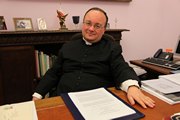
Msgr. Charles J. Scicluna is the "promoter of justice" of the Congregation for the Doctrine of the Faith. He is effectively the prosecutor of the tribunal of the former Holy Office, whose job it is to investigate what are known as "delicta graviora"; i.e., the crimes which the Catholic Church considers as being the most serious of all: crimes against the Eucharist and against the sanctity of the Sacrament of Penance, and crimes against the sixth Commandment ("thou shall not commit impure acts") committed by a cleric against a person under the age of eighteen. These crimes, in a "Motu Proprio" of 2001, "Sacramentum sanctitatis tutela" [the Vatican Latin version is here], come under the competency of the Congregation for the Doctrine of the Faith. In effect, it is the "promoter of justice" who deals with, among other things, the terrible question of priests accused of paedophilia, which are periodically highlighted in the mass media. Msgr. Scicluna, an affable and polite Maltese, has the reputation of scrupulously carrying out the tasks entrusted to him without deferring to anyone.
Question: Monsignor, you have the reputation of being "tough", yet the Catholic Church is systematically accused of being accommodating towards "paedophile priests".
Answer: It may be that in the past - perhaps also out of a misdirected desire to protect the good name of the institution - some bishops were, in practice, too indulgent towards this sad phenomenon. And I say in practice because, in principle, the condemnation of this kind of crime has always been firm and unequivocal. Suffice it to recall, to limit ourselves just to last century, the famous Instruction "Crimen sollicitationis" of 1922.
Q: Wasn't that from 1962?
A: No, the first edition dates back to the pontificate of Pius XI. Then, with Blessed John XXIII, the Holy Office issued a new edition for the Council Fathers, but only two thousand copies were printed, which were not enough, and so distribution was postponed sine die. In any case, these were procedural norms to be followed in cases of solicitation during confession, and of other more serious sexually-motivated crimes such as the sexual abuse of minors. [The 1962 text of Crimen sollictationis: Crimen sollicitationis.pdf]
Q: Norms which, however, recommended secrecy...
A: A poor English translation of that text has led people to think that the Holy See imposed secrecy in order to hide the facts. But this was not so. Secrecy during the investigative phase served to protect the good name of all the people involved; first and foremost, the victims themselves, then the accused priests who have the right - as everyone does - to the presumption of innocence until proven guilty. The Church does not like showcase justice. Norms on sexual abuse have never been understood as a ban on denouncing the crimes to the civil authorities.
Q: Nonetheless, that document is periodically cited to accuse the current Pontiff of having been - when he was prefect of the former Holy Office - objectively responsible for a Holy See policy of covering up the facts...
A: That accusation is false and calumnious. On this subject I would like to highlight a number of facts. Between 1975 and 1985 I do not believe that any cases of paedophilia committed by priests were brought to the attention of our Congregation. Moreover, following the promulgation of the 1983 Code of Canon Law, there was a period of uncertainty as to which of the "delicta graviora" were reserved to the competency of this dicastery. Only with the 2001 "Motu Proprio" did the crime of paedophilia again become our exclusive remit. From that moment Cardinal Ratzinger displayed great wisdom and firmness in handling those cases, also demonstrating great courage in facing some of the most difficult and thorny cases, "sine acceptione personarum". Therefore, to accuse the current Pontiff of a cover-up is, I repeat, false and calumnious.
Q: What happens when a priest is accused of a "delictum gravius"?
A: If the accusation is well-founded the bishop has the obligation to investigate both the soundness and the subject of the accusation. If the outcome of this initial investigation is consistent, he no longer has any power to act in the matter and must refer the case to our Congregation where it is dealt with by the disciplinary office.
Q: How is that office composed?
A: Apart from myself who, being one of the superiors of the dicastery, also concern myself with other matters, there are the bureau chief Fr. Pedro Miguel Funes Diaz, seven priests and a lay lawyer who follow these cases. Other officials of the Congregation also make their own vital contribution depending upon the language and specific requirements of each case.
Q: That office has been accused of working little and slowly...
A: Those are unjustified comments. In 2003 and 2004 a great wave of cases flooded over our desks. Many of them came from the United States and concerned the past. Over recent years, thanks to God, the phenomenon has become greatly reduced, and we now seek to deal with new cases as they arise.
Q: How many have you dealt with so far?
A: Overall in the last nine years (2001-2010) we have considered accusations concerning around three thousand cases of diocesan and religious priests, which refer to crimes committed over the last fifty years.
Q: That is, then, three thousand cases of paedophile priests?
A: No, it is not correct to say that. We can say that about sixty percent of the cases chiefly involved sexual attraction towards adolescents of the same sex, another thirty percent involved heterosexual relations, and the remaining ten percent were cases of paedophilia in the true sense of the term; that is, based on sexual attraction towards prepubescent children. The cases of priests accused of paedophilia in the true sense have been about three hundred in nine years. Please don't misunderstand me, these are of course too many, but it must be recognised that the phenomenon is not as widespread as has been believed.
Q: The accused, then, are three thousand. How many have been tried and condemned?
A: Currently we can say that a full trial, penal or administrative, has taken place in twenty percent of cases, normally celebrated in the diocese of origin - always under our supervision - and only very rarely here in Rome. We do this also in order to speed up the process. In sixty percent of cases there has been no trial, above all because of the advanced age of the accused, but administrative and disciplinary provisions have been issued against them, such as the obligation not to celebrate Mass with the faithful, not to hear confession, and to live a retired life of prayer. It must be made absolutely clear that in these cases, some of which are particularly sensational and have caught the attention of the media, no absolution has taken place. It's true that there has been no formal condemnation, but if a person is obliged to a life of silence and prayer, then there must be a reason...
Q: That still leaves twenty percent of cases...
A: We can say that in ten percent of cases, the particularly serious ones in which the proof is overwhelming, the Holy Father has assumed the painful responsibility of authorising a decree of dismissal from the clerical state. This is a very serious but inevitable provision, taken though administrative channels. In the remaining ten percent of cases, it was the accused priests themselves who requested dispensation from the obligations deriving from the priesthood, requests which were promptly accepted. Those involved in these latter cases were priests found in possession of paedophile pornographic material and, for this reason, condemned by the civil authorities.
Q: Where do these three thousand cases come from?
A: Mostly from the United States which, in the years 2003-2004, represented around eighty percent of total cases. In 2009 the United States "share" had dropped to around twenty-five percent of the 223 cases reported from all over the world. Over recent years (2007-2009), the annual average of cases reported to the Congregation from around the world has been two hundred and fifty. Many countries report only one or two cases. There is, then, a growing diversity and number of countries of origin of cases, but the phenomenon itself is much reduced. It must, in fact, be borne in mind that the overall number of diocesan and religious priests in the world is four hundred thousand, although this statistic does not correspond to the perception that is created when these sad cases occupy the front pages of the newspapers.
Q: And in Italy?
A: Thus far the phenomenon does not seem to have dramatic proportions, although what worries me is a certain culture of silence which I feel is still too widespread in the country. The Italian Episcopal Conference (CEI) offers an excellent technical-juridical consultancy service for bishops who have to deal with these cases. And I am very pleased to observe the ever greater commitment being shown by Italian bishops to throw light on the cases reported to them.
Q: You said that a full trial has taken place in around twenty percent of the three thousand cases you have examined over the last nine years. Did they all end with the condemnation of the accused?
A: Many of the past trials did end with the condemnation of the accused. But there have also been cases in which the priest was declared innocent, or where the accusations were not considered to have sufficient proof. In all cases, however, not only is there an examination of the guilt or innocence of the accused priest, but also a discernment as to his fitness for public ministry.
Q: A recurring accusation made against the ecclesiastical hierarchy is that of not reporting to the civil authorities when crimes of paedophilia come to their attention.
A: In some English-speaking countries, but also in France, if bishops become aware of crimes committed by their priests outside the sacramental seal of Confession, they are obliged to report them to the judicial authorities. This is an onerous duty because the bishops are forced to make a gesture comparable to that of a father denouncing his own son. Nonetheless, our guidance in these cases is to respect the law.
Q: And what about countries where bishops do not have this legal obligation?
A: In these cases we do not force bishops to denounce their own priests, but encourage them to contact the victims and invite them to denounce the priests by whom they have been abused. Furthermore, we invite the bishops to give all spiritual - and not only spiritual - assistance to those victims. In a recent case concerning a priest condemned by a civil tribunal in Italy, it was precisely this Congregation that suggested to the plaintiffs, who had turned to us for a canonical trial, that they involve the civil authorities in the interests of victims and to avoid other crimes.
Q: A final question: is there any statue of limitation for "delicta graviora"?
A: Here you touch upon what, in my view, is a sensitive point. In the past, that is before 1889, the statue of limitations was something unknown in canon law. For the most serious crimes, it was only with the 2001 "Motu Proprio" that a statute of limitations of ten years was introduced. In accordance with these norms in cases of sexual abuse, the ten years begin from the day on which the minor reaches the age of eighteen.
Q: Is that enough?
A: Practice has shown
that the limit of ten years is not enough in this kind of case, in which it
would be better to return to the earlier system of "delicta graviora"
not being subject to the statue of limitations. On 7 November 2002, Venerable
Servant of God John Paul II granted this dicastery the power to revoke that
statue of limitations, case by case following a reasoned request from
individual bishops. And this revocation is normally granted.
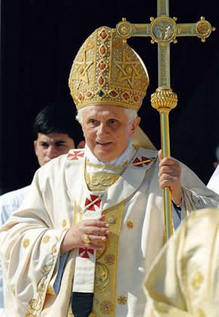 Given the recent problems for the Church in Germany, not to mention the USA, Netherlands, England and Ireland, I think we should offer a daily prayer for the Holy Father, Pope Benedict XVI. Confidently we can say that the current events weigh heavy on his heart; accusations and verifiable incidents of sexual and physical abuse by clergy is a dreadful experience to live through, especially if the problems are rampant in the Church, particularly with a brother being in the middle of controversy. Plus, Benedict turns 83 on April 16 and begins his 5th year as Pontiff on April 19. The prayer below use Psalm 40:3 for its content; there is a partial indulgence* attached the prayers.
Given the recent problems for the Church in Germany, not to mention the USA, Netherlands, England and Ireland, I think we should offer a daily prayer for the Holy Father, Pope Benedict XVI. Confidently we can say that the current events weigh heavy on his heart; accusations and verifiable incidents of sexual and physical abuse by clergy is a dreadful experience to live through, especially if the problems are rampant in the Church, particularly with a brother being in the middle of controversy. Plus, Benedict turns 83 on April 16 and begins his 5th year as Pontiff on April 19. The prayer below use Psalm 40:3 for its content; there is a partial indulgence* attached the prayers.Benedict XVI addressed participants in a short course on the internal forum on March 11 hosted and organized by Archbishop Fortunato Baldelli and Bishop Gianfranco Girotti, OFM Conv., of the Apostolic Penitentiary. Next to the celebration of the Mass, there is likely no other important work of a priest than to reconcile sinners to God. This is a helpful teaching of the Pope's since at the seminary dinner table these days there's much conversation about the priest's ministry of forgiveness. Note what I think are the important points the Holy Father makes regarding the dialogue of salvation.
Your course is placed, providentially, in the Year for Priests, which I proclaimed for the 150th anniversary of the birth in heaven of St. John Mary Vianney, who exercised in a heroic and fruitful way the ministry of reconciliation. As stated in the letter of proclamation: "All of us priests must hear those words which regard us personally that he (the Curé d'Ars) put in Christ's mouth: 'I will charge my ministers with proclaiming to sinners, whom I am always ready to receive, that my Mercy is infinite.' From the Holy Curé d'Ars we priests can learn not only an inexhaustible trust in the sacrament of penance, which drives us to put it at the center of our pastoral concerns, but also the method of the 'dialogue of salvation' that should be carried out in it."
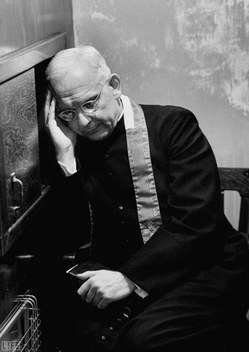
Where do the roots of heroism and fruitfulness sink, with which St. John Mary Vianney lived his own ministry of confessor? First of all in an intense personal penitential dimension. The awareness of one's own limits and the need to take recourse to Divine Mercy to ask for pardon, to convert the heart and to be sustained on the path of sanctity, are essential in the life of the priest: Only one who has first experienced its greatness can be a convinced herald and administrator of the Mercy of God. Every priest becomes minister of penance by his ontological configuration to Christ, High and Eternal Priest, who reconciles humanity with the Father; however, fidelity in administering the sacrament of reconciliation is entrusted to the responsibility of the presbyter.
We live in a cultural context marked by a hedonistic and relativistic mentality, which tends to cancel God from the horizon of life, does not favor the acquisition of a clear picture of values of reference and does not help to discern good from the evil and to mature a correct sense of sin. This situation makes even more urgent the service of administrators of Divine Mercy.
We must not forget, in fact, that there is a sort of vicious circle between obfuscation of the experience of God and the loss of the sense of sin. However, if we look at the cultural context in which St. John Mary Vianney lived, we see that, in several aspects, it was not so dissimilar from ours. Also in his time, in fact, a hostile mentality to faith existed, expressed by forces that sought actually to impede the exercise of the ministry. In such circumstances, the Holy Curé d'Ars made "the church his home," to lead men to God. He lived radically the spirit of prayer, the personal and intimate relationship with Christ, the celebration of Mass, Eucharistic adoration and evangelical poverty, appearing to his contemporaries as such an evident sign of the presence of God, as to drive so many penitents to approach his confessional.
In the conditions of liberty in which it is possible to exercise today the priestly ministry, it is necessary that the presbyters live in a "lofty way" their own response to their vocation, because only one who becomes every day the living and clear presence of the Lord can arouse in the faithful the sense of sin, give courage and have the desire born for the forgiveness of God.
Dear brothers, it is necessary to turn to the confessional, as place in which to celebrate the sacrament of reconciliation, but also as place in which to "dwell" more often, so that the faithful can find mercy, counsel and comfort, feel loved and understood by God and experience the presence of Divine Mercy, close to the real Presence in the Eucharist.
The "crisis" of the Sacrament of Penance,
so often talked about, is a question that faces first of all priests and their
great responsibility to educate the People of God to the radical demands of the
Gospel. In particular, it asks them to dedicate themselves generously to the
listening of sacramental confessions; to guide the flock with courage, so that
it will not be conformed to the mentality of this world (cf. Romans 12:2), but
will be able to make choices also against the current, avoiding accommodations
and compromises. Because of this it is important that the priest have a
permanent ascetic tension, nourished by communion with God, and that he
dedicate himself to a constant updating in the study of moral theology and of
human sciences.
St. John Mary Vianney was able to establish with penitents a real and proper "dialogue of salvation," showing the beauty and greatness of the Lord's goodness and arousing that desire for God and heaven, of which the saints are the first bearers. He affirmed: "The good God knows everything. Before you even confess, he knows that you will sin again and yet he forgives you. How great is the love of our God, which drives him to willingly forget the future, so as to forgive us" (Monnin A., Il Curato d'Ars. Vita di Gian-Battista-Maria Vianney, Vol. 1, Turin, 1870, p. 130).
It is the priest's task to foster that experience of "dialogue of salvation," which, born of the certainty of being loved by God, helps man to acknowledge his own sin and to introduce himself, progressively, into that stable dynamic of conversion of heart, which leads to the radical renunciation of evil and to a life according to God (cf. Catechism of the Catholic Church, No. 1431).
Dear priests, what an
extraordinary ministry the Lord has entrusted to us! As in the Eucharistic
Celebration he puts himself in the hands of the priest to continue to be
present in the midst of his people, similarly, in the sacrament of
reconciliation he entrusts himself to the priest so that men will have the
experience of the embrace with which the Father receives the prodigal son,
restoring him the filial dignity and reconstituting him fully heir (cf. Luke
15:11-32).
 Come, blessed of my Father, says the Lord: I was ill
and you comforted me. I tell you, anything you did for one of my brothers, you
did it for me.
Come, blessed of my Father, says the Lord: I was ill
and you comforted me. I tell you, anything you did for one of my brothers, you
did it for me.Paul's conversion (and let me echo the words of St Augustine used speaking about his own conversion) is simply the passage from his dedication to God to recognition of what God has done and does in Jesus.
Augustine describes his conversion thus: "When I read the apostle Paul [and immediately afterwards -because it is not enough to the Scriptures--he adds:] and when Your hand healed the sadness of my heart, then I understood the difference inter praesumptionem et confessionem / between dedication and recognition." Praesumptio does not indicate a bad thing. In the long term it decays into bad presumption, but initially it indicates a person's attempt to achieve the good ideal intuited. Christian conversion is the passage from this attempt to do good (good works, said Pope Benedict) to the simple recognition of the presence of Jesus. From praesumptio, dedication, to confessio, recognition. The confessio, recognition, is like when the child says, 'Mamma." As when the mother comes towards the child and it says, 'Mamma."
Christian conversion, for Augustine and Paul, is (let me use the image of Don Giussani's that, in my opinion, has no equivalent) the transition from the enthusiasm of dedication to the enthusiasm of beauty; from the enthusiasm of one's own dedication, which in itself is good, to the enthusiasm aroused by a presence that attracts the heart, a presence which gratuitously comes forward and gratuitously makes itself recognized. Paul had done nothing to meet Him. His gratuitous coming forwards accomplishes the transition from our dedication to the beauty of His presence that makes itself recognized through attraction. And between recognition and dedication there is no contradiction. Giussani says simply that "enthusiasm of dedication is incomparable with the enthusiasm of beauty." It is the same term St Augustine uses when he describes the relationship between the virtue of men and the first steps of those who put their hope in the grace and mercy of God.
We might also say that when by grace a person happens to live the same experience that Paul went through, his same experience, in the infinite remove from him, it is as if all the Christian words, the word of faith, the word salvation, the word Church, were transparent of the initiative of Jesus Christ. It is He who stirs faith, Faith is His working. It is He who saves. Bestowing salvation is His initiative. It is He who builds His Church. "Aedifcabo ecclesiam meam" (Mt 16:18). Aedificabo is a future tense [verb]: "I will build my Church" on the profession of faith of Peter, on the grace of faith given to Peter (cf. Mt 16:18). It is He who builds personally, in the present, His Church on a gift of His.
Giussani was speaking to a group of young people. At a certain point he
asked: "What puts us in relationship with Jesus Christ? What, now, puts us in
relationship with Jesus Christ?" People said: "The Church," "The community,"
"Our friendship," and so on. At the end of all the suggestions, Giussani
repeated the question: "What puts us in relationship with Jesus Christ?" And
then gave the answer himself: "The fact that He is risen." Because were He not
risen, were He not alive, the Church would be a merely human institution, like
so many others. One burden more. All things merely human in the become a
burden. The Church is the visible term of the gesture of the living Jesus who
meets the heart and attracts it.
Don Giacomo Tartandini, 30 Days, no. 6/7 2009
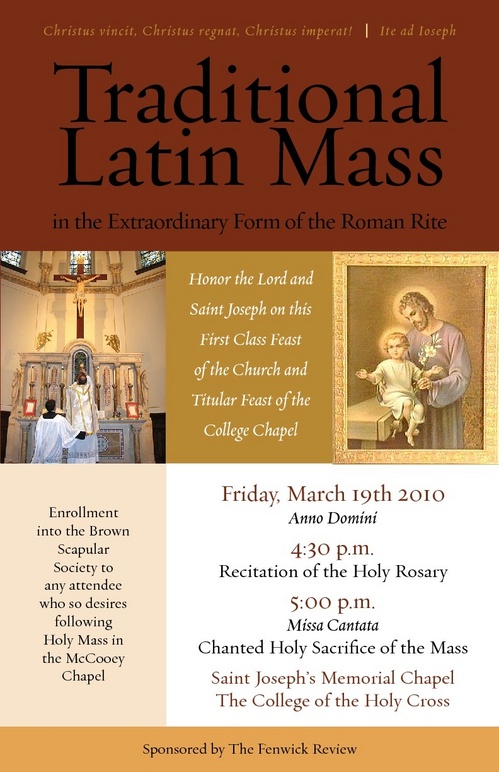
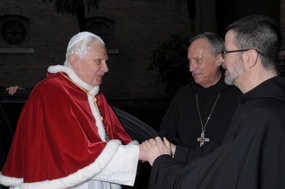 My friend Dom Elias Lorenzo, monk of St. Mary's Abbey
(Morristown, NJ), is currently serving as the Superior and Prior of the Abbey
of Sant'Anselmo in Rome, Italy, the headquarters of international Benedictine
Confederation and home to the Pontifical Liturgical Institute.
My friend Dom Elias Lorenzo, monk of St. Mary's Abbey
(Morristown, NJ), is currently serving as the Superior and Prior of the Abbey
of Sant'Anselmo in Rome, Italy, the headquarters of international Benedictine
Confederation and home to the Pontifical Liturgical Institute.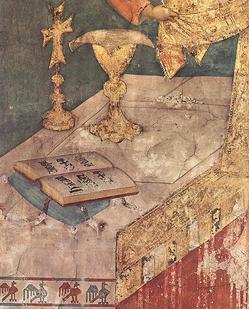 Have you ever thought of Pope Benedict XVI's liturgical "style"? Or have you asked yourself, "What does Pope Benedict think about the sacred Liturgy?" Or have you asked yourself, "Do I know what the meaning of Catholic Liturgy is for the Church? Good. I want you to ask these questions because I want to encourage you to read some good things on the Liturgy and not the crap you generally find in the NCR or America Magazine. You can read longer works of Ratzinger's like A New Song for the Lord, The Feast of Faith, The Spirit of the Liturgy, Looking Again at the Question of the Liturgy with Cardinal Ratzinger, God and the World (Ch. 17), among others.
Have you ever thought of Pope Benedict XVI's liturgical "style"? Or have you asked yourself, "What does Pope Benedict think about the sacred Liturgy?" Or have you asked yourself, "Do I know what the meaning of Catholic Liturgy is for the Church? Good. I want you to ask these questions because I want to encourage you to read some good things on the Liturgy and not the crap you generally find in the NCR or America Magazine. You can read longer works of Ratzinger's like A New Song for the Lord, The Feast of Faith, The Spirit of the Liturgy, Looking Again at the Question of the Liturgy with Cardinal Ratzinger, God and the World (Ch. 17), among others.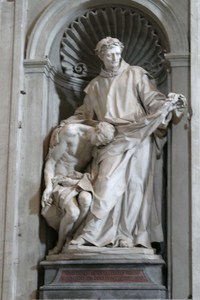 Father, You gave John of God love and compassion for others. Grant that by doing good for others we may be counted among the saints in Your kingdom.
Father, You gave John of God love and compassion for others. Grant that by doing good for others we may be counted among the saints in Your kingdom.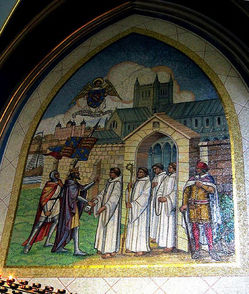 Under King Henry VIIIs order, many Cistercian monks were cruelly
put to death for Catholic faith, the some may argue about pretexts. In the
months of March and May 1537, died for the Catholic faith
Under King Henry VIIIs order, many Cistercian monks were cruelly
put to death for Catholic faith, the some may argue about pretexts. In the
months of March and May 1537, died for the Catholic faith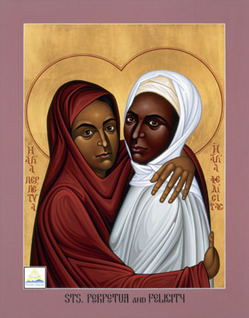 Theirs is the kingdom of heaven who despising a worldly life have attained the rewards of the kingdom, and have washed their robes in the Blood of the Lamb.
Theirs is the kingdom of heaven who despising a worldly life have attained the rewards of the kingdom, and have washed their robes in the Blood of the Lamb.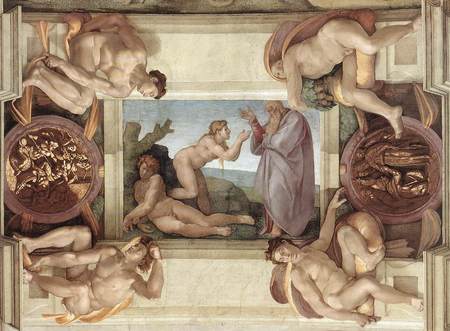 Sexuality is a beautiful part of being human and it is a gift from God that needs to be known, understood, appreciated and embraced (no pun intended). Sexuality is a holy part of being a man or a woman. Unfortunately, that's not the message we receive in secular society and it is infrequently heard from the pulpit in Catholic churches and very likely not in other Christian communities. Unheard of from the pulpit, that is, until Pope John Paul II introduced his monumental work, Theology of the Body. But that's a topic for another time. Sexuality is not just a religious issue, it is a human issue and everything human is of our interest.
Sexuality is a beautiful part of being human and it is a gift from God that needs to be known, understood, appreciated and embraced (no pun intended). Sexuality is a holy part of being a man or a woman. Unfortunately, that's not the message we receive in secular society and it is infrequently heard from the pulpit in Catholic churches and very likely not in other Christian communities. Unheard of from the pulpit, that is, until Pope John Paul II introduced his monumental work, Theology of the Body. But that's a topic for another time. Sexuality is not just a religious issue, it is a human issue and everything human is of our interest.
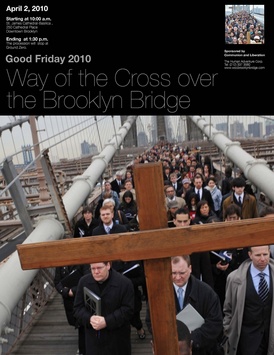
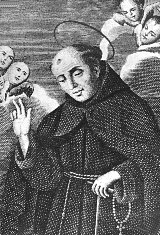
He was in prayer and even spent the night praying and giving thanks.
Father, You raised Your servant Saint John Joseph of the Cross through the rugged way of poverty, humility and patience to heavenly glory. Grant us the grace to follow his example so as to share in eternal joy.
Saint John
Joseph comes from the island of Ischia, off the coast of Naples. Some might say
it is better than Capri. Virtuous from his earliest days he followed the path
set by Saint Peter of Alcantara -the same person who was a spiritual father to
Saint Teresa of Jesus-- who developed a strict observant Franciscan fraternity
which emphasized contemplation and penance. John Joseph was such an exemplary friar
that he was asked to be ordained a priest and to make Franciscan foundations.
In time he was appointed both master of novices and provincial superior. His
humility endeared him to others; he insisted on menial tasks even though he had noble birth and positions of influence. John Joseph was zealous for souls and it is
reported that he had the gift of prophecy and healing. As an insightful
confessor John Joseph would encourage people to pray, live simply and be
devoted to the Blessed Virgin Mary.
More on Saint John Joseph can be read here.
In the famous Sermon on the Mount Jesus speaks of the three important spiritual exercises: fasting, prayer and almsgiving. Here I want to write about fasting. And over the many centuries that the Catholic Church has existed, there has been development in the teaching based on experience.
Jesus' teaching on fasting is this:
*Fasting is an extremely important means --not an ends-- of resisting sin and the threat of hell.
*Fasting is practiced as a memorial of Christ's death on Good Friday; it ought to be practiced each Friday but the Church only requires fasting on Ash Wednesday and Good Friday.
*Fasting is intimately linked to prayer and almsgiving as spiritual exercises.
In paragraph of 2043 of the Catechism of the Catholic Church, quoting the Code of Canon Law, states, "The fourth precept ("You shall observe the days of fasting and abstinence established by the Church") ensures the times of ascesis and penance which prepare us for the liturgical feasts and help us acquire mastery over our instincts and freedom of heart."
Our Church still believes that fasting is not only helpful, but is required because it forms and reforms a sense of faith, hope and charity. Serious Christians will not abandon the practice of fasting, especially before significant events in life like baptism, confirmation, marriage, ordination, etc. So what does the Church believe about fasting? Fasting means...
*There are two fast-days on which we are allowed but one full meal but person can have one full meal, take two other meatless meals, to maintain strength, according to one's needs. Taken together these two meatless meals should not equal another full meal.
*All people over 18 and under 59 years of age, and whose health and occupation will permit them to fast. (Abstinence begins for those who are 14.) The Church, showing mercy, does excuse certain persons from the obligation of fasting on account of age, health, work, or the circumstances in which they live. Children, from the age of seven years, and persons who are unable to fast are bound to abstain on days of abstinence, unless they are excused for sufficient reason. If questions persist, please find a parish priest for consultation.
*Fast-days occur during Advent and Lent, on the Ember days and on the vigils or eves of some great feasts. A vigil falling on a Sunday is not observed.
Fasting is often seen by some people as antiquated, harmful, or a waste of time. To think that fasting is only about the legal requirements of the faith, is a serious reduction of the practice of religion to ideology. Moralism is shallow and gets us no where. I will say, fasting is an essential part of being formed in the Catholic faith, adhering closely to Christ. No one who takes seriously their faith can dispense themselves without good reason from fasting as Christ fasted. Yes, it is hard and yes it is annoying but the pay-off is profound because it opens the body, the heart and the mind to grace. Fasting allows us to see more deeply and clearly the conversion we are called to work on, and to be less satisfied with the status quo. Fasting assists our restlessness in tending towards God by stripping away sin (and a little weight comes off, all the better).
I have to say there is a beauty in fasting because it is a method in emptying myself of that which weighs me down either with food --which makes me sluggish and at time incapable of listening to the movements of the Holy Spirit in my life-- or fasting from sinful tendencies which can also make me sluggish but there is a significant risk in not fasting from sin because sin leads away from God and from the heart of the Church, the sacrament of Christ on earth.

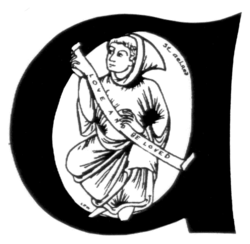 2010 marks the ninth centenary of the birth of Saint
Aelred of Rievaulx, an extraordinary English monk of the twelfth-century. At Ampleforth Abbey, a noted English Benedictine abbey, today marks the saint's birthday; and since I like Aelred and have a friend at Ampleforth, I am mentioning the saint again this year to mark his anniversary. (As an aside, his year of birth is variously noted as 1109 or 1110.) In Saint Aelred's time and location priestly was not universal, even if some scholars try to
posit such a thought. Aelred's father and grandfather were both proprietary
priests of Hexham in Northumberland. Aelred joined the newly founded abbey of
Rievaulx, and because of his many gifts and influential friends (St Bernard of
Clairvaulx and King David of Scotland and England whose mother was St Margaret, starters), he became the
abbey's third abbot in 1147 after serving as abbot of Revesby Abbey. He was abbot for twenty years. Rievaulx became the mother
house of other Cistercian monastic houses which fostered the Benedictine reform
in England and Scotland. As abbot, Aelred was responsible for vast holdings of
property and an abbey with 600 lay brothers and choir monks. In the Cistercian system
of governance, abbots are required to be the Father-Immediate (an official
visitor) to other communities in order to maintain the monastic way of life as established in the Charter of Charity (their constitution). The amazing
part of Aelred's life became even more amazing when you consider that he was an
author many works, most notably Christian Friendship (also called On Spiritual Friendship, which some say is a Christianized version of Cicero's De Amicita) and The Mirror of Charity
written at the command of St Bernard and in-print today. Father David Knowles, OSB, called Aelred the "St Bernard of the North." Rievaulx Abbey no
longer exists except in magnificent ruins located not far from Ampleforth
Abbey.
2010 marks the ninth centenary of the birth of Saint
Aelred of Rievaulx, an extraordinary English monk of the twelfth-century. At Ampleforth Abbey, a noted English Benedictine abbey, today marks the saint's birthday; and since I like Aelred and have a friend at Ampleforth, I am mentioning the saint again this year to mark his anniversary. (As an aside, his year of birth is variously noted as 1109 or 1110.) In Saint Aelred's time and location priestly was not universal, even if some scholars try to
posit such a thought. Aelred's father and grandfather were both proprietary
priests of Hexham in Northumberland. Aelred joined the newly founded abbey of
Rievaulx, and because of his many gifts and influential friends (St Bernard of
Clairvaulx and King David of Scotland and England whose mother was St Margaret, starters), he became the
abbey's third abbot in 1147 after serving as abbot of Revesby Abbey. He was abbot for twenty years. Rievaulx became the mother
house of other Cistercian monastic houses which fostered the Benedictine reform
in England and Scotland. As abbot, Aelred was responsible for vast holdings of
property and an abbey with 600 lay brothers and choir monks. In the Cistercian system
of governance, abbots are required to be the Father-Immediate (an official
visitor) to other communities in order to maintain the monastic way of life as established in the Charter of Charity (their constitution). The amazing
part of Aelred's life became even more amazing when you consider that he was an
author many works, most notably Christian Friendship (also called On Spiritual Friendship, which some say is a Christianized version of Cicero's De Amicita) and The Mirror of Charity
written at the command of St Bernard and in-print today. Father David Knowles, OSB, called Aelred the "St Bernard of the North." Rievaulx Abbey no
longer exists except in magnificent ruins located not far from Ampleforth
Abbey.
Archimandrite Manuel Nin, rector of the
Lent in the Western Syriac tradition is preceded by a tradition that begins with the Fast of the Ninevites, which has as its reference and model the people of Niniveh who converted after hearing the Prophet Jonah's preaching.
In these days of fasting the deceased -priests, foreigners and faithful-- are commemorated and this means that the Church and Western Syriac liturgical tradition are closely bound to pilgrimages to the holy places and the tombs of martyrs.
The Lenten Liturgy begins with what is called the "Monday of oil" and one of the hymns of St Ephrem gives us the key to its interpretation: "stained bodies are anointed with sanctifying oil with a view to expiation. They are purified but not destroyed. They descend marked by sin and arise as a child."
This was originally a rite of anointing for catechumens that was later extended to all the faithful: the Liturgy also links it to the anointing at Bethany: "How gentle is the voice of the sinful woman when she says to the perfumer: "Give me the oil and tell me the price; give me the best quality oil and with it I shall mingle the sorrow of my tears, the better to anoint the first-born of the Most High; I trust in the Lord that through this oil he will forgive me my sins. The Lord see her faith and forgives her."
The six Sundays of Lent take the name of the Gospel passage that is read: the miracle of
 The miracle of Cana of Galilee begins the series of miracles contemplated in Lent to indicate mercy, forgiveness, salvation and life, which are given to us by Christ, the physician of humankind.
The miracle of Cana of Galilee begins the series of miracles contemplated in Lent to indicate mercy, forgiveness, salvation and life, which are given to us by Christ, the physician of humankind.
At Vespers of the First Sunday of Lent this aspect is developed at length: "Good Physician who heals all through repentance, Lord, sovereignly good and the First Physician, source of life and fount of healing, who heals our souls through our physical illness. You who have been called our true Samaritan and who, to deliver us from the wounds of our sins, have poured upon them mysterious oil and wine. You, Doctor of hearts and Healer of suffering, have marked us with the sign of the Cross, sealed with the seal of the holy oil, nourished with your Body and your Blood; embellish our souls with the splendor of your holiness; protect us from every fall and every blemish and bring us to the blessed inheritance reserved for those who have done acts of penance."
Furthermore, the Syriac tradition sees in the miracle of
 St Ephrem sings: "Blessed are your guests, beautiful city of
St Ephrem sings: "Blessed are your guests, beautiful city of
The new wine that unites the fellow guests at the banquet is a symbol of the precious Blood that unites us with Christ himself: "You who, as the promised Spouse redeem the Church with your Blood, you who gladden the wedding guests of
On all the Sundays in Lent prior to the celebration of the Lord's Passion, death and Resurrection, the Western Syriac tradition wishes to celebrate the miracles with which the Savior desired to manifest his divine mission among human beings. The Morning Office of all the Sundays in Lent contains this prayer:
"Merciful Lord, who came down to earth, in your compassion for human nature, you who purified the leper, opened the eyes of the blind and raised the dead, obtain that our souls may be purified and bodies sanctified; that the eyes of our hearts may be opened to understand your teachings so that, with repentant sinners, we may raise our praise."
The miracles recounted and celebrated on these Sundays lead us to contemplate the wonders of divine grace in human souls; thus many of the liturgical texts of Lent always end with the same conclusive refrain:
"We, too, Lord pray to you: touch our spirit and purify it from every stain, from every impurity of sin, and have mercy on us."
Around the world in past 2 weeks Communion and Liberation's Schools of Community have been praying for the good of Communion and Liberation while remembering the 5th anniversary of death of Monsignor Luigi Giussani. In the Archdiocese of Ottawa last Monday (February 22) Archbishop Terrence Prendergast, SJ celebrated Mass for CL-Ottawa and here is a portion of his homily. One of the touching points in His Grace's homily is the phrase, "to follow Christ." The same phrase I used for my coat of arms; see above.
Five years ago today, Don Luigi Giussani, the founder of a movement that came to be known as Communion and Liberation was called home to God by the Lord Jesus Christ. Cardinal Ratzinger, our present pope was sent by Pope John Paul II as his legate to the funeral ceremony in Milan. On that occasion, he testified to the way in which Don Giussani had allowed himself to be led by Christ in a loving relationship from his earliest years, just as Peter had from the moment of his first encounter with Jesus: "This love affair with Christ, this love story which is the whole of his life, was however far from every superficial enthusiasm, from every vague romanticism. Really seeing Christ, he knew that to encounter Christ means to follow Christ. This encounter is a road, a journey, a journey that passes also-as we heard in the psalm-through the 'valley of darkness.' In the Gospel, we heard of the last darkness of Christ's suffering, of the apparent absence of God, when the world's Sun was eclipsed. He knew that to follow is to pass through a 'valley of darkness,' to take the way of the cross, and to live all the same in true joy."
St. Francis Xavier expressed this in a lovely poem, "O Deus, Ego Amo Te," translated touchingly by his brother Jesuit, the poet Gerard Manley Hopkins:
O GOD, I love thee, I love thee-
Not out of hope of heaven for me
Nor fearing not to love and be
In the everlasting burning.
Thou, thou, my Jesus, after me
Didst reach thine arms out dying,
For my sake sufferedst nails, and lance,
Mocked and marred countenance,
Sorrows passing number,
Sweat and care and cumber,
Yea and death, and this for me,
And thou couldst see me sinning:
Then I, why should not I love thee,
Jesu, so much in love with me?
Not for heaven's sake;
not to be out of hell by loving thee;
Not for any gains I see;
But just the way that thou didst me
I do love and I will love thee:
What must I love thee, Lord, for then?
For being my king and God. Amen.
 Let us rejoice and shout for joy, because the Lord of all things has favored this holy and glorious virgin with his love.
Let us rejoice and shout for joy, because the Lord of all things has favored this holy and glorious virgin with his love.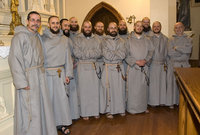
Penance, essentially, always requires a change of life: from sin to virtue, luke warmness to fervor, fervor to sanctity. This interior change cannot be effected without divine help, but the Lord is not stingy in this regard, and even as he is calling a man to penitence, he is offering the grace necessary for this conversion.
For the Christian, to heed the call to do penance and to open his heart to the grace of conversion, means living his baptism, the sacrament through which men are plunged into the paschal mystery of Christ; they die with him, are buried with him, and rise with him. It is for this reason that during Lent the Liturgy often dwells on baptismal themes.
Death and resurrection in Christ, which are operative from baptism, are not a static fact which happened once for all, but a vital dynamic fact which should involve the Christian in the Lord's death and resurrection every day.
Divine Intimacy
Father Gabriel of
St. Mary Magdalen, OCD
 United in prayer to God the Father, we ask Him to hear the pope's prayers for this month, especially,
United in prayer to God the Father, we ask Him to hear the pope's prayers for this month, especially,
The general intention
That the world economy may be managed according to the principles of justice and equity, taking account of the real needs of peoples, especially the poorest.
The missionary intention
That the Churches in
